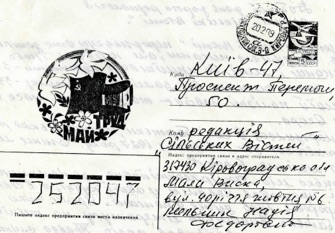












Full Name in Ukrainian: Надія Федорівна Мельник
Full Name in English: Nadiia Melnyk
Data of Birth: July 14, 1927
Place of Birth: Batky
Raion: Opishnia raion (currently Poltava raion)
Oblast: Kharkiv oblast (currently Poltava oblast)
Country: Ukraine
Copy of original: Yes
Envelope: Yes
Number of pages: 6
Keywords: Ukraine--History--Famine, 1932-1933--Personal narratives; Famines--Ukraine--History--Sources; Famine victims; Holodomor; Голодомор; child; search brigades; survival strategies; food substitution; arson; political persecution; Stalin; grain requisitioning; mass mortality; family mortality; 1946-1947 Famine; cannibalism; evacuation (WWII).


In 1932 her father bought a new house and grew grain on his land lot. The harvest was good, but in winter of 1932-1933 the “red brigade” took away all the grain. The family of five survived by selling valuables (mother’s gold cross and samovar) to Torgsin in exchange for some grain. They then used ground corn cobs, linden leaves and weeds that they would mix with the flour to prepare pancakes known as “matorzhenyky”. Once the first rye spikelets appeared [in 1933] in the [collective farm] field, Nadiia’s parents stole some at night and ground them into flour. Nadiia’s mother baked bread and took one loaf to her father (Nadiia’s grandfather) Okar Syla who lived with his two sons and a daughter. She divided the bread into four parts and warned her siblings and father not to eat too much bread all at once. But the elderly man “might have lost his mind” – he ate his portion immediately and after Nadiia’s mother left, he ate his sons’ portions. He died that same night. His two sons, Nadiia’s mother’s brothers, soon died of starvation and only their sister Priska survived.
SYNOPSIS

The UCRDC depends on voluntary donations – both individual and institutional - for its financing.
It provides receipts for tax purposes.
-
‣Home
Nadiia Melnyk was born in 1927 and survived the Holodomor as a child in the village of Batky, Opishnia raion, Kharkiv oblast (currently Batky, Poltava raion, Poltava oblast).
Nadiia’s father was a blacksmith and owned his own workshop before the collectivization. Their house was burnt in 1931. Nadiia believes that it was in retaliation after her father refused to turn a rifle into a short gun for some “gangsters” (bandyty).




